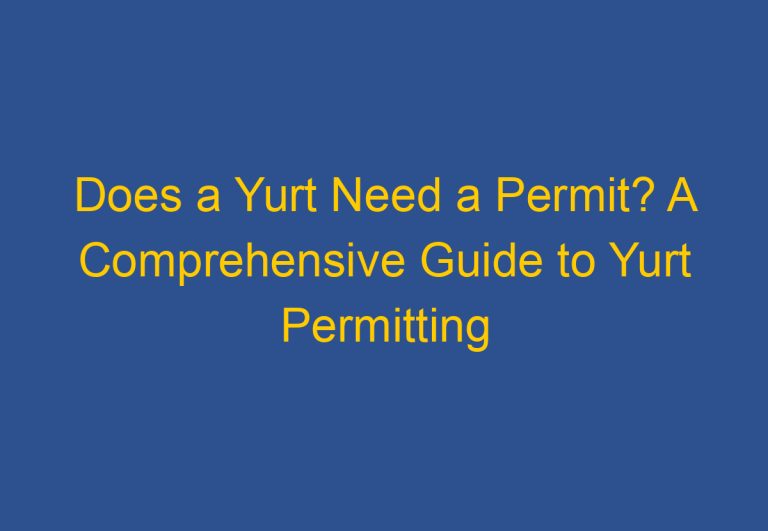Can You Insure a Yurt? A Comprehensive Guide to Yurt Insurance
Yurts are becoming increasingly popular as a housing option for those seeking a more eco-friendly and cost-effective way of living. However, with this rise in popularity comes the question of insurance. Can you insure a yurt? The answer is yes, you can insure a yurt, but it may require a specific type of insurance policy.
Yurt insurance is a specialized type of insurance policy that is designed to protect yurt owners from the various risks they may face. This type of insurance is similar to conventional homeowners insurance, but it is tailored to the unique needs of yurt owners. Yurt insurance can cover a range of risks, including damage caused by natural disasters, theft, and liability claims.
It is important to note that not all insurance companies offer yurt insurance. It may take some research to find a company that does. Additionally, the cost of yurt insurance may vary depending on factors such as location, size, and the materials used to construct the yurt. Overall, while yurt insurance may require some extra effort to obtain, it is possible to insure a yurt and protect your investment.
Understanding Yurt Insurance
Yurts are becoming increasingly popular as a housing option for those who want to live off the grid or simply enjoy a unique living experience. However, many people may not know that yurt insurance is available to protect their investment. In this section, we will discuss what yurt insurance is, how it differs from traditional homeowners policies, the types of coverage available, and the importance of liability coverage.
What Is Yurt Insurance?
Yurt insurance is a type of policy that provides coverage for yurts, which are circular tents traditionally used by nomads in Central Asia. Yurt insurance policies can vary in coverage, but they typically cover the structure of the yurt, any personal property inside, and liability in case someone is injured on the property. Some policies may also cover additional structures on the property, such as sheds or outbuildings.
Differences from Traditional Homeowners Policies
Yurt insurance policies differ from traditional homeowners policies in a few key ways. First, yurt insurance policies are designed specifically for yurts, whereas traditional homeowners policies are designed for more conventional structures. Second, yurt insurance policies may have different coverage options, such as coverage for the unique features of a yurt, like the circular frame and lattice walls. Third, traditional homeowners policies may not cover yurts at all, or may only offer limited coverage.
Types of Coverage Available
There are several types of coverage available under yurt insurance policies. The most common types of coverage include:
- Property coverage: This covers damage to the yurt itself, as well as any personal property inside.
- Liability coverage: This covers any injuries or damages that occur on the property, such as if someone slips and falls on the yurt platform.
- Additional structures coverage: This covers any additional structures on the property, such as sheds or outbuildings.
- Natural disaster coverage: This covers damage caused by natural disasters, such as floods or earthquakes.
Importance of Liability Coverage
Liability coverage is an important part of any yurt insurance policy. If someone is injured on the property, liability coverage can help cover the cost of medical bills, lost wages, and other damages. Without liability coverage, the yurt owner could be held personally liable for these costs, which could be financially devastating. It is important to note that liability coverage may have limits, so it is important to choose a policy with adequate coverage.
In conclusion, yurt insurance is an important investment for anyone who owns a yurt. It provides protection for the structure, personal property inside, and liability in case of injury or damage on the property. It is important to choose a policy with adequate coverage for your specific needs.
Securing Your Yurt Against Risks
When it comes to owning a yurt, it is essential to protect it against risks such as natural disasters, fire, and theft. By securing your yurt with comprehensive insurance coverage, you can have peace of mind knowing that you are financially protected in case of loss or damage.
Protecting Against Natural Disasters
Yurts are susceptible to natural disasters such as hurricanes, storms, earthquakes, and floods. It is crucial to ensure that your insurance policy covers these types of disasters to protect your property from damage. You can also take additional steps such as securing your yurt to the ground and trimming nearby trees to reduce the risk of damage during a storm.
Addressing Fire and Theft Concerns
Yurts are also at risk of fire and theft, especially if you use them as primary residences or vacation rentals. A comprehensive insurance policy can cover repair or replacement costs for property damage and personal property loss due to fire or theft. You can also take precautions such as installing smoke detectors, fire extinguishers, and security cameras to reduce the risk of fire and theft.
Choosing the Right Insurance Company
When choosing an insurance company for your yurt, it is essential to consider their coverage options, premiums, and reputation. Look for a company that offers tailored insurance solutions for yurt owners and has experience in insuring unique properties. You can also check their ratings and reviews to ensure they have a good reputation for customer service and claims handling.
Working with an Insurance Agent
Working with an insurance agent can help you navigate the insurance process and find the right coverage for your yurt. An agent can help you assess your risks, choose the right policy, and file a claim if necessary. Look for an agent who has experience in insuring unique properties and can provide personalized service to meet your needs.
By taking these steps to secure your yurt against risks, you can enjoy your property with peace of mind knowing that you are financially protected in case of loss or damage.
Frequently Asked Questions
What types of insurance are available for yurts?
When it comes to insuring a yurt, there are a few different types of insurance policies to consider. Homeowners insurance and renters insurance are two common options that may provide coverage for a yurt, depending on the policy and the insurance company. Additionally, some insurance companies offer specialized yurt insurance policies that are tailored specifically to the needs of yurt owners.
How does location affect yurt insurance coverage?
Location can have a significant impact on yurt insurance coverage. Yurts located in areas that are prone to natural disasters, such as wildfires or floods, may be more difficult to insure or may require additional coverage. Additionally, yurts located in areas with high crime rates may also be more expensive to insure.
What factors influence the cost of insuring a yurt?
Several factors can influence the cost of insuring a yurt. These include the location of the yurt, the size and value of the yurt, and the amount of coverage needed. Additionally, factors such as the yurt’s age, construction materials, and safety features may also affect the cost of insurance.
Are there any specific considerations for insuring a yurt used for glamping?
If a yurt is being used for glamping, there may be additional insurance considerations to keep in mind. For example, if the yurt is being used for commercial purposes, it may require a different type of insurance policy than a yurt that is being used as a primary residence. Additionally, the amount of coverage needed may be different for a glamping yurt than for a traditional residential yurt.
What safety measures can be taken to ensure a yurt is insurable?
There are several safety measures that yurt owners can take to help ensure that their yurt is insurable. These may include installing smoke detectors, fire extinguishers, and carbon monoxide detectors, as well as taking steps to prevent damage from natural disasters, such as reinforcing the yurt’s foundation and securing loose objects in high winds.
How should one assess the insurance needs for a yurt before purchase?
Before purchasing a yurt, it is important to assess the insurance needs for the structure. This may involve researching different insurance policies and providers, as well as considering factors such as the location of the yurt, the size and value of the yurt, and the intended use of the yurt. Additionally, yurt owners should consider consulting with an insurance agent or broker to help determine the best insurance options for their specific needs.












